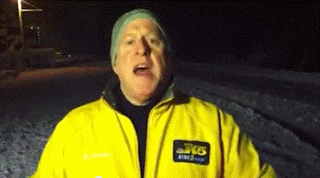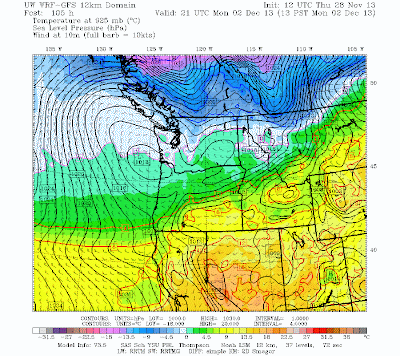What's not to like? Snow will not impede holiday travel on Sunday, but heavy rain in the passes and on the Cascade western slopes might make for some tedious driving.
The media, and some of us meteorologists, have been focused too much on snow and cold.. Mother nature is like a magician: keeps us watching the wrong thing, while the real story (heavy rain and flooding), always in the open, is ignored.
Today, Saturday, will be uneventful with clouds and a bit of light rain. Perfect for shopping or reading a good book. But on early Sunday the real action will begin, moderate to heavy rains, particularly over the western Cascade slopes. Here is the precipitation forecast for the 24-h ending 4 AM on Monday. VERY heavy rain on the western slopes of the central and southern Cascades, reaching 5-10 inches.
This is not your typical pineapple express/atmospheric river with the moisture coming from the southwest..instead high water vapor values will move northward in the mid-Pacific and head directly into us from the west (see graphic for Sunday at 4 PM). With the moisture and winds at crest level from the west-southwest, there will be considerable rain shadowing over the northwestern Sound (see map above)
The heavy rain will cause the rivers to rapidly rise, with some reaching flood stage. Take a look at the current forecast from the NWS River Forecast Center for the Snoqualmie near Carnation. This is a major flood.
And the river forecast center is predicting high water levels on a number of western Washington rivers draining the western slopes of the Cascades (see graphic)
On Sunday there will be a large north-south pressure gradient and thus the winds will pick up substantially from the south. particularly Sunday AM. Here are the sustained wind forecasts for 8 AM on Sunday. Strong winds in the Strait (35 knots) and over central and southern Puget Sound (25 knots). The gusts will be stronger. With most leaves down and pruning from previous windstorms, I don't expect a large number of power outages.

So we covered heavy rain, flooding, and strong winds--and are just starting here!
The cold front will reach the northern WA coast during the morning and push through during the day. The surface forecast map at 4 PM shows the front reaching the southern WA coast...and note there will be strong southerly winds along the Oregon coast at that time. The primo cold air has not reached us yet.
During the next 24 hour cold air floods in behind the cold front and from air pushing south from BC. Here is the same surface map a day later...wow...a different world. The cold front has reached the Oregon/CA border and truly cold arctic air (purple) is now in southern BC. Northeasterly winds are now pushing through the Fraser River gap into Bellingham and the San Juans.
The atmosphere will be cold enough to snow and substantial snow will fall in the mountains between late Sunday and Tuesday morning. Here is the plot of 48-h snow totals ending 4 PM on Monday. Some locations in the north Cascades will get nearly three feet. Much less in the south Cascades (up to about a foot). Mt. Baker will have wonderful skiing I am sure.
Lowland snow? The big question for local media, and a lot of folks are nervous about the famous snow/ice situation at the end of the November 26, 2006 Seahawks game, where some people had to walk home.
Nov. 26, 2006 Seahawks Game
Quite honestly this is not an idea set up for significant lowland snow...but we will have cold enough air by mid-day Monday. There will not be a general lowland snow event. But there are three possibilities of some light localized snow later on Monday and Tuesday AM: in a Puget Sound convergence zone, at the leading edge of the northerlies coming out of the Fraser Gap, or upslope on the NE side of the Olympics. The models are not going for much, but we need to watch it.
We will have very cold temperatures next week..the coldest in two years (last winter was very wimpy in all ways). Lows in the mid-20s will be everywhere west of the Cascade crest, with colder spots getting into upper teens. You don't even want to know about eastern Washington (single digits!).
I tell my students that we can get lowland snow when the cold air comes in and when it leaves. Guess what? The current models suggest a significant snow event for portions of western Washington on Saturday. Will give the media something to hype about this week!
He is getting ready.... (click on image for the video)
Announcements
Are you in venture capital/private equity and have an office in the Bay Area, or knows someone who does?
If so, I have a question for you. Please send me an email (cmass at uw.edu) ....thanks, cliff









































